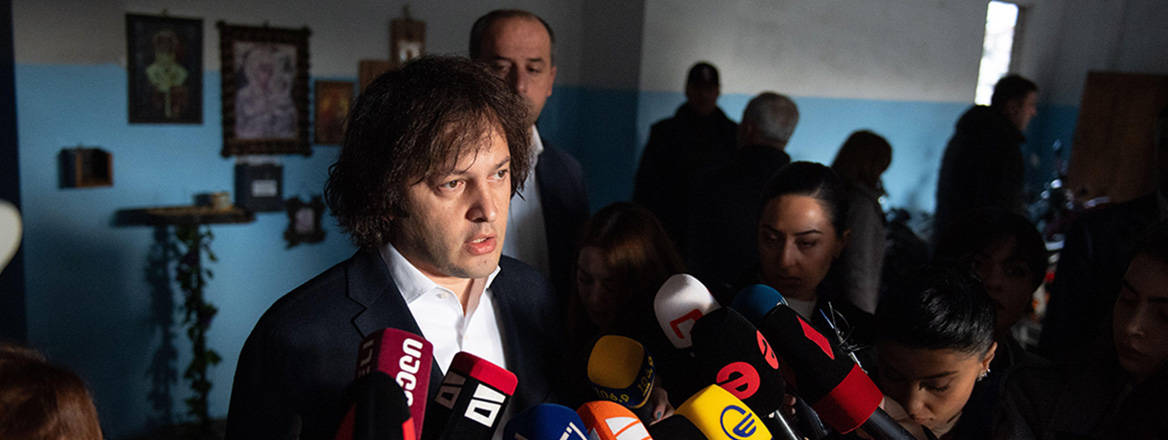Georgia’s pivotal 2024 elections, fraught with allegations of fraud, have plunged the country into political crisis and cast deep uncertainty over its European aspirations.
On 26 October 2024, more than two million Georgian citizens went to the polls. Many voters regarded the parliamentary elections as existentially important for the country’s future. For the first time ever, Georgia’s elections were seen as a process that would determine its foreign policy trajectory either as pro-Western or pro-Russian.
Throughout the past three decades, elections have never been a quiet and predictable process in Georgia. In most cases, they have marked the beginning of instability and high political tensions. Yet, there was also the 2012 experience, when Georgia surprised the world with its peaceful and democratic transition of power when an increasingly authoritarian President Mikheil Saakashvili accepted the defeat of his party by Georgian Dream. Opposition-minded voters have hoped that history would repeat itself, yet instead it looks like Georgia is braced for a prolonged period of political crisis and uncertainty.
Contested Results
Moments after the polling stations closed, two independent polling organisations predicted the collective victory of four opposition parties over Georgian Dream. Soon, the official election results showed a completely different picture: a landslide victory for the ruling party with nearly 54% of the votes, which equates to more than million voters casting their ballots in favour of them.
According to the official results, Georgian Dream, which has recently introduced a number of divisive laws, stalled the EU integration process and threatened to ban opposition parties, gained nearly the same amount of votes as in 2012 when it was at the peak of its popularity. This result was deeply shocking to opposition-minded voters. While all sides waited for the final verdict by the joint International Election Observation Mission led by the OSCE Office for Democratic Institutions and Human Rights (OSCE/ODIHR) in Europe, the president of Georgia, Salome Zourabichvili, denounced the election results as illegitimate and urged citizens to protest against major electoral fraud conducted by the ruling party. All four opposition parties joined the president and declined their parliamentary mandates.
The opposition's strategy to place such a heavy focus on Georgia’s European future in the electoral campaign had its benefits but also contained risks
The crucial importance of the 2024 elections was already obvious earlier in the year when the Georgian Dream government introduced the highly divisive so-called foreign agents law despite popular protests against it. The law’s passing was a watershed moment that threw Georgia’s European future into question and fast-tracked Tbilisi’s alienation from longstanding strategic partners including the US and EU countries. It has also made it harder for Georgian Dream to make the case that it is still committed to the country’s European aspirations. Yet, allegations of large-scale electoral fraud as well as multiple cases of violations that were recorded by election observers indicate that not only Georgia’s European future but also its fragile democracy might be threatened to a whole new extent.
EU Membership with a Twist
Ahead of the elections, the foreign agents law and popular outrage against it gave a competitive advantage to an opposition that prior to that was largely seen as fragmented and weak. Despite political differences, the opposition managed to more or less unite into different coalition groups and provide the voters with at least four different choices. Although the main opposition parties have very different and in some cases controversial political backgrounds, the four groups managed to brand themselves as a pro-European opposition which promised to return the country into the European orbit and to unfreeze Georgia’s EU integration process.
The strategy to place such a heavy focus on Georgia’s European future in the electoral campaign had its benefits but also contained risks. While a large majority of Georgian citizens (86% according to an IRI poll) support European integration and share anti-Russian sentiments, the opposition counted on collecting pro-European votes and made EU integration the core promise of its campaign. Yet, Georgian Dream also promised to secure EU membership for the country, but with a twist.
The ruling party reassured its voters that it would achieve EU membership for the country but without losing dignity – in short, following the Hungarian model. It framed itself as a protector of traditional family values, which has resonated particularly with conservative voters who still claim to want EU integration but are worried about their country losing these values. It was not a coincidence that the only leader from the EU who recognised the legitimacy of the election results was Hungarian Prime Minister Viktor Orban, who also paid a visit to Tbilisi on 28–29 October. While 13 member states issued a joint statement indicating that Orban could not speak on behalf of the EU, with this high-level visit Georgian Dream tried to deliver a message to a concerned public that Georgia could have EU membership on its own terms.
International Response
While Georgia is facing long-term political turmoil, the West’s decision to either recognise or denounce the election results will have a decisive impact on the country’s future. So far, leaders in the EU as well as the US have been measured in their assessments but have also expressed concerns about irregularities and called for prompt investigation.
The preliminary findings of the joint OSCE/ODIHR mission identified a number of serious shortcomings and violations. In the meantime, the opposition is trying to test the appetite for wider protests, while also promising voters that it will effectively deliver evidence of fraud and other election-related irregularities to Georgia’s partners in order to increase the pressure on the government. The endgame of the opposition seems to be to contest the elections through the investigation of collected evidence of fraud in order to finally call for new free and fair elections.
Yet, the public support for protests will largely be determined by the Western response. Unless Georgians feel like their concerns are being shared and backed by the US and the EU, it will be hard to motivate tens of thousands of citizens to consistently show up on the streets. After months of street protests due to the introduction of the foreign agents law, Georgians are exhausted and want the opposition to come up with a sensible action plan.
Moscow knows well that the weakening of Georgian democracy will simultaneously diminish the Western footprint in the region, thus providing it with a perfect opportunity to further increase its influence
While Georgia is already facing a constitutional and political crisis, based on its recent annual report on Enlargement, the European Commission confirmed that Georgia’s accession process had been stalled. EU leaders have repeatedly mentioned that unless Georgia reverses its course, all options including halting visa liberalisation are on the table. The EU is now facing multiple challenges: first and foremost, it needs to decide how to deal with the Georgian case from a long-term perspective without damaging the soft power that it already has within Georgian society and losing the battle against Russian disinformation. Halting the visa liberalisation policy, for instance, would feed into the pro-Russian narrative that the EU was never serious about accepting Georgia as a member state, and over time would risk sowing nihilism within a society that has fearlessly fought for its European future.
In the meantime, Moscow seems pleased with the current instability. The Editor in Chief of RT, Margarita Simonyan, reacted joyfully to the election results by claiming that Georgians had won. Meanwhile, former Russian President Dmitry Medvedev accused the Georgian president of plotting a coup and suggested that she should be prosecuted. Moscow knows well that the weakening of Georgian democracy will simultaneously diminish the Western footprint in the region, where Georgia has always been the most pro-Western country, thus providing Russia with a perfect opportunity to further increase its influence. Therefore, the 2024 parliamentary elections meant much more than just choosing a ruling party for the next four years.
Right now, the future of Georgian democracy is at stake. The survival of Georgia’s European aspirations will depend on to what extent the election fraud allegations are investigated and then followed by meaningful responses from the international community.
© Natia Seskuria, 2024, published by RUSI with permission of the author
The views expressed in this Commentary are the author’s, and do not represent those of RUSI or any other institution.
For terms of use, see Website Ts&Cs of Use.
Have an idea for a Commentary you’d like to write for us? Send a short pitch to commentaries@rusi.org and we’ll get back to you if it fits into our research interests. Full guidelines for contributors can be found here.
WRITTEN BY
Natia Seskuria
RUSI Associate Fellow, International Security
- Jim McLeanMedia Relations Manager+44 (0)7917 373 069JimMc@rusi.org



